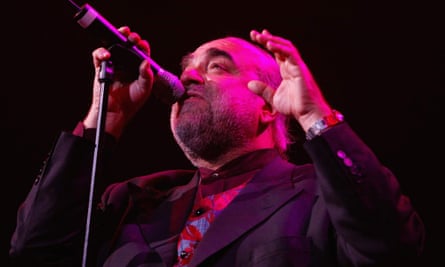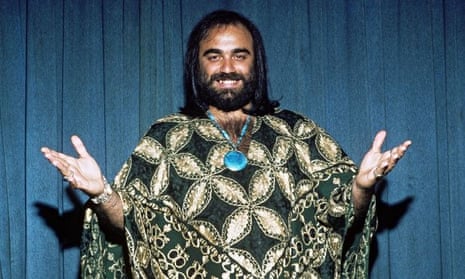Few pop artists of the past 50 years achieved such global recognition as Demis Roussos, who has died aged 68. The kaftan-clad, middle-of-the-road crooner was reported to have sold more than 60m records in his long career. Yet despite his huge success, his portly stature and tousled beard attracted criticism and mirth – in Mike Leigh’s 1977 play Abigail’s Party, for instance, the hapless hostess Beverly, played by Alison Steadman, is revealed to be one of his most ardent fans.
One of Roussos’s most enduring signature songs – and one beloved by Beverly – was the title track of his 1973 album Forever and Ever. The album reached No 2 in the UK charts in 1974. It was followed by Happy to Be On an Island in the Sun, a specially written number by David Lewis shrewdly aimed at the British fondness for Mediterranean holidays, and a top 10 hit in 1975, as was the accompanying album. Roussos said: “The reason for my big success in England was that the Brits started wanting to go on holidays to Greece and Spain. My music came right on time. It was romantic Mediterranean music addressed to all those people.”
He was born in Alexandria, Egypt, to George Roussos and Nelly Mazloum. His father, a civil engineer with a construction company, was of Greek extraction and his mother was of Egyptian and Italian origin. Demis’s vocal abilities were recognised at an early age and he became a soloist with the choir of the Greek Orthodox church in Alexandria. He also took up the guitar and trumpet.
Increasing xenophobia in Egypt led his family to emigrate to Athens in 1961. There Demis took up the bass guitar and as a teenager sang and played in a series of pop groups including the Idols and We Five. Among his fellow performers were the keyboards player Evangelos Papathanassiou (aka Vangelis) and the drummer Loukas Sideras, with whom he formed Aphrodite’s Child in 1967.
The trio decided that they needed to get closer to the centre of the international music industry and set off for London. Unfortunately, they were turned back at Dover due to visa problems. Retreating to Paris, they were able to audition successfully for executives at the Philips record company. Their first recording sessions were delayed by the general strike of May 1968 but later that year, Rain and Tears by Aphrodite’s Child was issued across Europe. Composed by Vangelis and the French lyricist Boris Bergman, and featuring Roussos’s unusual high tenor, the song was only a minor hit in Britain but created a sensation in many other countries.
Aphrodite’s Child had more hit singles in continental Europe and went on to record the album 666 (made in 1970 but released in 1972), based on religious texts from the apocalypse of St John, but soon afterwards Vangelis’s ambition to create film music caused the group to split up. He and Roussos would occasionally collaborate in later years, notably in 1981 when Roussos sang Race to the End, a vocal version of Vangelis’s theme from Chariots of Fire, with lyrics by Jon Anderson of the progressive rock band Yes.
Roussos embarked on a solo career with the album Fire and Ice (1971), whose first single We Shall Dance was a summer hit across Europe, though not in Britain. In 1972 he toured Spain, Italy, the Netherlands, Germany and Greece. The following year he went to South America. Although Roussos songs were generally written in English, usually by the Athens-born Lakis Vlavianos, he often rerecorded them in French, German and Spanish, and even, on one occasion, in Japanese.
In 1973, Roussos released Forever and Ever, which became his first British hit record after widespread television appearances, including on the Nana Mouskouri Show and the children’s show the Basil Brush Show. In 1976 a BBC TV documentary, The Roussos Phenomenon, produced by John King, kindled further interest in the singer. Philips issued a four-song record of the same name (including a version of Forever and Ever), which became the first EP to top the British singles chart. A few months later, the single When Forever Has Gone was only kept from achieving the same position by Abba’s Dancing Queen.
Critics had often remarked on Roussos’s weight and by the end of the 1970s, when he weighed nearly 150kg (about 23st 9lb), Roussos had become concerned. After trying several diets, he found one that helped him lose 50kg in 10 months. In 1982, he described this process in the book A Question of Weight.
In 1985, Roussos was travelling on TWA Flight 847 from Athens to Rome, when it was hijacked by Hezbollah terrorists and flown to Beirut. Most of the passengers were held hostage for 17 days but Roussos and other Greek citizens on board were released after five.

Although his popularity in Britain declined from its 70s peak, Roussos continued to record and perform round the world until shortly before his death. A recent tour of France included shows in churches, a sign of his deeply held Christian faith. Even sceptical reviewers were forced to acknowledge his enduring popularity. As a Guardian critic at his Royal Festival Hall concert in 2002 put it: “As he dances about the stage like a delighted uncle at a boozy wedding, he is impossible to dislike and – as ever – utterly unique.”
He is survived by a daughter, Emily, and son, Cyril.

Comments (…)
Sign in or create your Guardian account to join the discussion